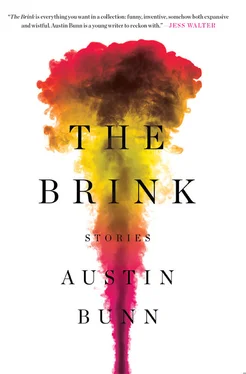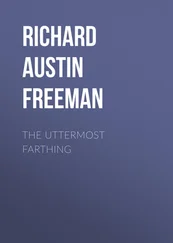“She asks about you,” Sam says.
The cranking and banging stop. The newscaster says the pilot was a boy.
“She does? What do you say?”
“I told her,” Sam begins, “that you have a new friend. And her name is Jerusha.”
His father glides out on his sled, turns down the radio. “Why did you tell her that?”
The lies are getting hard for him to think through. First strike is easy. But second and third and fourth go further than he can see.
“I wanted her to know you have somebody.”
“I have somebody,” his father says. “I have you.”
This is his father trying to make him feel worthy. But Sam knows that he’s the consolation prize, what you win when you’ve actually lost. “It’s not the same.”
His father taps a wrench against his leg. “Your mother just needs some time. Just wait.”
But how much time, Sam thinks. Because there won’t always be time. Japanese people got hit so hard by light they became permanent shadows — an old man with a cane, a mother with baby stroller — and their shadows won’t even wash off the ground. Time ends. He’s seen the pictures.
From here on out, the professor says, class is about the after. “Let’s say we hear the big alarms. Let’s just say we have five minutes before a ten-megaton explosion over New York City.”
Sam’s eyes go instinctively to the row of high windows in the room. It is noon and clear, but the weather doesn’t tell you anything — it was beautiful that morning in Hiroshima too. In his mind, he can see the cloud trace of arcing missiles like rows of close-rule paper in the sky.
“Imagine nobody is coming for us,” the professor says. “Now what?”
Their suggestions go up on a blackboard. Store water from the water fountain. Cover the windows. Ration their lunches. Sam has walked through these steps in his head so many times they are polished smooth with worry.
“I want to be with my parents,” Jerusha says. “In heaven.”
The professor tugs at his beard. “I’m okay with that.”
Jerusha lies flat and stares up at the ceiling.
“What are you doing?” Irwin asks.
“I’m waiting for the angel.”
The professor picks up a coffee can with a plastic wrapper over the top. “Does anyone know what this is?” Sam has seen the designs in Protect and Survive , the booklet he ordered from the Department of Defense. “It’s a fallout meter,” Sam says. “It measures the atmosphere. It tells you when you can go outside.”
“Very good,” the professor says, and for the rest of class they make their own meters. The professor passes out the empty cans, and Sam notices flakes of instant coffee stuck to the bottom. A dank and spicy smells rises out. They pour in the crushed gypsum, which looks like white dirt, and hang two squares of aluminum foil above it on kite string.
“How do we know these things work?” Ethan asks. His fallout meter looks broken, the string sagging. He has gypsum powder sprinkled on his pants.
“Well, we won’t know,” the professor says, “until it happens, really.”
“But then we’ll be dead.”
The professor points at him. “And that is a distinct possibility.”
“That’s retarded,” Ethan says. He motors over to the trash can and dunks his fallout meter.
“I’m okay with that,” the professor says.
Then Ethan rams his chair into the door to the outside. But it doesn’t open and he’s stuck there, his chair straining. He leans over and shoves the bar to drive forward, but when the door opens, his chair lodges in the gap. From the effort, Ethan begins to cough wetly, buckling over and hacking into his lap. It sounds like he’s drowning on the inside.
Sam goes to him. Everybody should be able to open a door.
Ethan sits up, his eyes gluey and cheeks flush.
“Fuck off,” Ethan says, weakly, and wheels himself outside.
The professor follows Ethan out. He’s gone for a long time, long enough for the twins to practice strangling each other until they can withstand wiggling fingers at their necks. Ethan’s Panama hat lies crumpled on the floor, and Sam takes it. Through the window, he can sees Ethan at the curb, waiting in the sun.
“Ethan is fine,” the professor says when he returns. “He had a tantrum like this last time.”
“Last time?” Sam asks. “He’s been in this class before?” So that is how Ethan knew about the chips and the rules, about the consequences for winning early.
The professor stares out at Ethan. “He’ll come back.”
Except Ethan doesn’t. They finish with the fallout meters and nobody learns anything except that gypsum tastes like ash and they can flick balls of tinfoil across the room if they do it right. And still Ethan waits in the sun. Nobody comes. Just like the professor said. Nobody will come for them and one day this class, this room, might be all they have.
The next day, Ethan doesn’t show. Or the day after. He’s in the hospital, Jerusha says. Her parents are friends with his mother, and she said he got to the top of the list for his operation. She brought a get-well card for everyone to sign. It goes around the room, and when Sam gets it, he sees just a bunch of fancy signatures. The card was a chance to practice their penmanship.
Sam writes, “I have your hat.”
They never see Ethan again.
On the last day of class, out on the front porch, Mom hugs Latrice and moans softly into her shoulder. Sam is disgusted. His mother never hugged his father on the way out. Latrice doesn’t deserve what his father didn’t get. He tells Latrice, telepathically, that her time in their lives is coming to an end. As they embrace, Latrice turns her mother slightly so she can scan the street, see who is seeing them.
“I’m going to be late for class,” Sam says.
They separate into their cars, but when Mom turns the key, Sam hears just a small click, softer maybe that what he expected. The engine doesn’t start. Latrice leans into the window.
“What do you think?” Mom asks.
“No idea,” Latrice says. “I won’t even pretend.” The way she says it, she pretends sometimes.
Sam says again that he’s going to be late.
“Latrice can take both of us in her car,” Mom says. But that will change the order of things, Sam thinks, the way the future has to happen.
“I can?” Latrice says, and Sam replies, “I don’t want to go with her.”
Mom massages her temples. “Come on, guys. Work with me.”
Latrice studies Sam skeptically, as though she can see through to his secret. But at this point, Sam doesn’t actually need to do more than make his loyalties plain.
His mom whispers, “ Shit .”
“I wish you wouldn’t swear,” Latrice says.
Mom looks up at Latrice with exhaustion. “Really?”
Sam opens the glove compartment, where the covert pack of cigarettes is, and hands them over. Mom snatches the pack from him. “You’re not supposed to know about these. Don’t know about these.”
“We should call Dad,” Sam says.
Latrice now seems impatient. She says she has somewhere to be. She has decided this problem is not her problem.
“I’ll call you,” Latrice says, backing off.
She leaves and Mom goes to the front stoop to sit, fiddling with the fern, yanking off the dead parts. It has more dead parts than green parts. The plant supposed to be his , his reward for letting his father go, but it’s nobody’s plant, put where nobody’s looking. He remembers his mom bringing it home, so springy with life, saying, “You need to learn how to keep things alive,” but it smelled like crotch, and Sam felt betrayed. The person who could give him a plant as a gift was someone who didn’t know him at all.
Читать дальше











